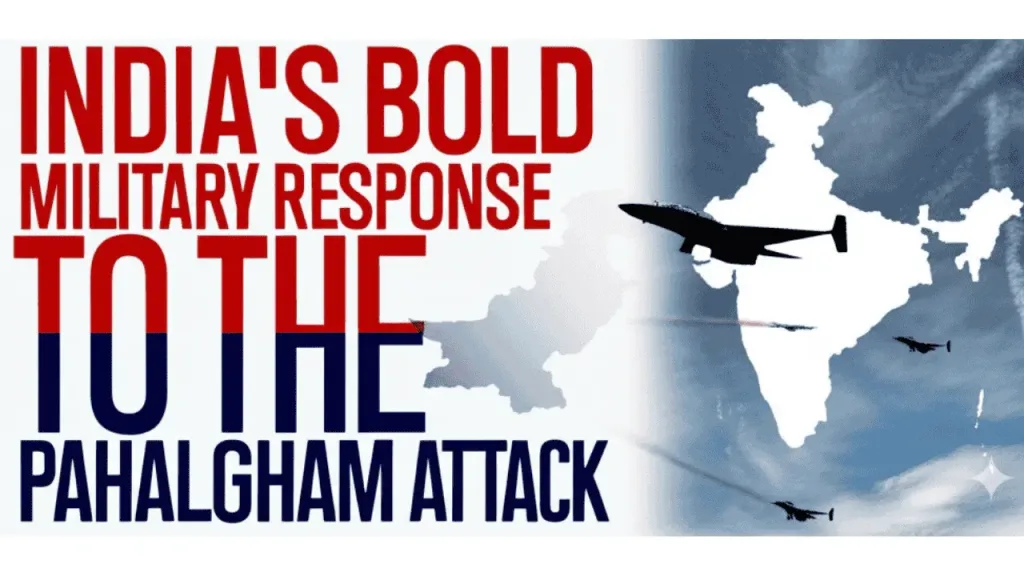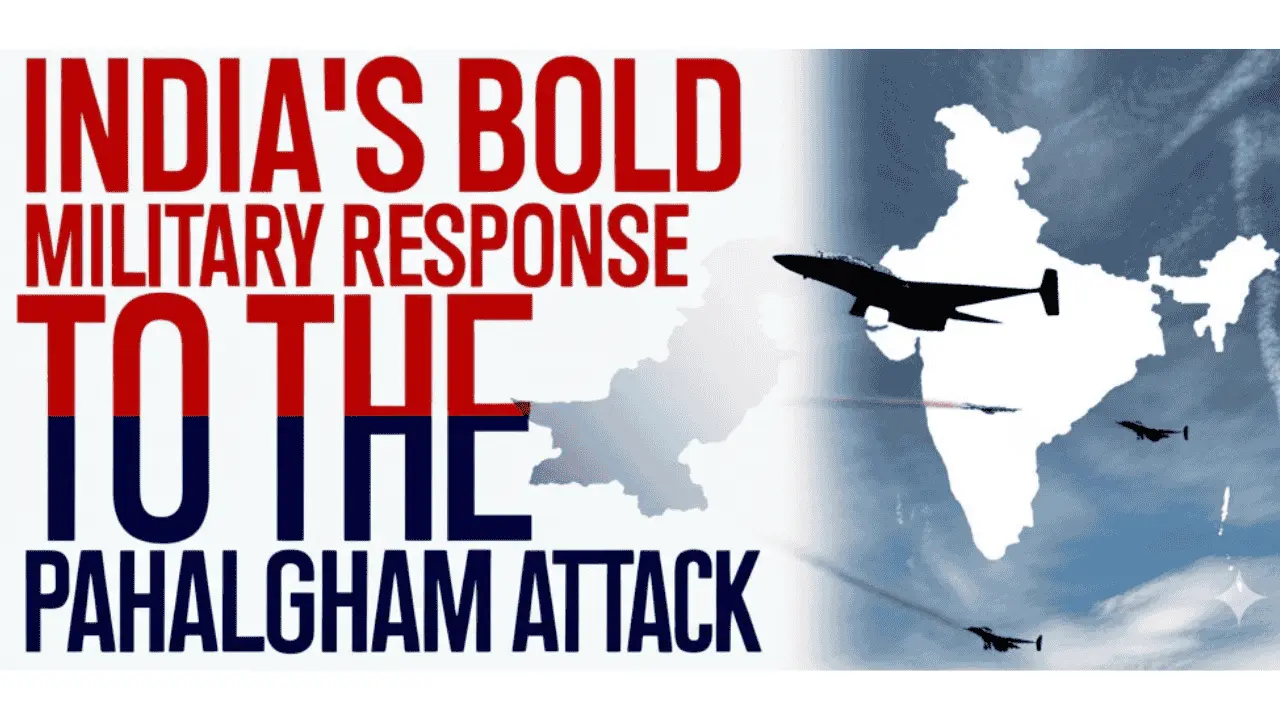In a rapidly escalating situation along the India-Pakistan border, India’s military response to the Pahalgam attack in Jammu and Kashmir is sending shockwaves through the region. As tensions between the two nuclear-armed neighbors reach new heights, India is taking bold actions in both military and diplomatic spheres, signaling a commitment to confronting terrorism and safeguarding national security.
India’s Bold Military Response: A Defiant Stand Against Terrorism
In a candid statement, a former Pentagon official recently urged India to adopt a strategy similar to Israel’s when responding to terrorism—emphasizing that India must take decisive action against Pakistan-backed terror groups. This call to action comes in the wake of the deadly Pahalgam attack, which has intensified the already fraught relationship between the two nations. Drawing parallels with Israel’s strong military operations against Hamas, the official stressed that India’s past responses, while significant, have not gone far enough.
To demonstrate its resolve, the Indian Navy successfully test-fired the MR-7 missile from its warship in the Caribbean Sea, a clear signal to Pakistan of India’s military capabilities. Pakistan’s response was predictably provocative, with officials issuing veiled threats of retaliation. In parallel, the Indian Air Force conducted airstrikes, further escalating the situation.
The Udhampur Operation: Sacrifice and Bravery
Meanwhile, the security forces on the ground in Jammu and Kashmir have been on high alert. A joint operation between the Indian Army and Jammu and Kashmir Police, based on intelligence inputs, led to a fierce encounter in the Basantgarh region of Udhampur. Tragically, during the confrontation, Special Forces Constable J. Ali Sheikh was critically injured and later succumbed to his wounds. His death marks yet another sacrifice in the ongoing battle against terrorism, and India honors his bravery in the face of relentless threats.
Diplomatic Retaliation: Freezing Relations with Pakistan
As the military situation intensifies, India is also ramping up its diplomatic pressure on Pakistan. The government has decided to freeze the 1960 Indus Water Treaty, which has long been a cornerstone of bilateral relations. In addition, India has shut down the Integrated Checkpost at Atari, canceled all visas for Pakistani nationals, and demanded that those already residing in India vacate the country before their visas expire.
Further diplomatic moves have included the expulsion of several senior officials from Pakistan’s High Commission in New Delhi. Defence, military, naval, and air advisers were declared persona non grata and given just one week to leave India. In retaliation, India has recalled its own diplomatic staff from Pakistan, reducing the number of personnel in Islamabad from 55 to 30 by May 1, 2025.
One notable symbolic gesture came with the suspension of the Border Security Force’s retreat ceremony at Atari. No longer will Indian guards shake hands with their Pakistani counterparts, signaling a complete break in cordiality along the border. Additionally, India has informed major global powers—including the United States, the United Kingdom, France, and China—of the situation in Kashmir and the ongoing crisis.
Prime Minister Modi’s Strong Message: “We Will Not Tolerate Terrorism”
Indian Prime Minister Narendra Modi’s address to the nation reinforced India’s zero-tolerance policy towards terrorism. He declared that India would leave no stone unturned in the pursuit of justice for the victims of terror attacks, including those responsible for the Pahalgam assault. His words were clear: India will relentlessly track down terrorists and their backers, taking whatever actions necessary to protect its sovereignty.

The Captivity of BSF Constable PK Singh: A Heightened Crisis
Amidst the military and diplomatic escalation, an alarming development occurred at the Firozpur border. BSF Constable PK Singh was captured by Pakistani Rangers after inadvertently crossing the border. India is seeking a flag meeting with Pakistan to secure his release. Disturbingly, photos of Singh blindfolded and held at gunpoint have emerged, adding a layer of complexity to the already tense situation.
In response to these developments, India’s Armed Forces have launched an official visit to Srinagar to assess the security situation and review counter-terrorism operations along the Kashmir Valley and the Line of Control (LoC). Increased surveillance and heightened security measures are now in place in Mumbai and other coastal regions, with additional patrols deployed as precautionary steps.
Indian Navy’s Show of Strength: Missile Tests and Air Exercises
On the naval front, India has demonstrated its formidable military capabilities, with the Indian Navy successfully test-firing the MR-7 missile from the INS Surat, a guided missile destroyer. The missile executed a sea-skimming maneuver with precision, further highlighting India’s advanced defense technology.
At the same time, the Indian Air Force is preparing for a large-scale exercise called “Attack,” which will see Rafale and Su-30 MKI fighter jets conducting ground attack missions and electronic warfare drills. This exercise aims to enhance India’s readiness for any potential escalation.
Pakistan’s Response: Bluster and Threats
Pakistan has predictably condemned India’s suspension of the Indus Water Treaty, calling the move an “act of war.” Pakistan has also warned of dire consequences should India attempt to alter the flow of water from the Indus River. The Pakistani government has retaliated by closing its airspace to Indian airlines and halting trade, even through third-party nations.
On the military front, Pakistan has raised its defense alert and is reportedly preparing for naval exercises in the Arabian Sea. The Pakistani Army has bolstered its presence along the LoC and is reportedly conducting heightened surveillance along the borders, signaling its readiness for potential conflict.
Saifullah Kasuri Denies Role in Pahalgam Attack: A Web of Deceit
Amidst the rising tensions, a new twist has emerged in the investigation into the Pahalgam attack. Saifullah Kasuri, a key figure suspected of masterminding the assault, has denied any involvement in the attack, claiming that Indian media has falsely implicated him. Despite his denials, evidence continues to point to Kasuri’s ties with Hafiz Saeed, the notorious mastermind behind many terror attacks in the region. Kasuri’s statements have done little to quell suspicions, and his video denial has sparked further controversy.
Identifying the Attackers: A Closer Look at the Suspects
Indian authorities have identified five suspects linked to the Pahalgam attack, three of whom are Pakistani nationals—Asif Fauji (aka Moosa), Suleman Shah (aka Yunus), and Abu Talha (aka Asif). The remaining two are locals from Jammu and Kashmir—Adil Guri and Ehsan—both of whom were reportedly trained in Pakistan. The suspects had infiltrated India in a coordinated effort to destabilize the region and stoke communal tensions. Indian agencies have released sketches of the suspects and are offering rewards for information leading to their capture.
Propaganda and Disinformation: Pakistan’s War of Words
Alongside military threats, Pakistan’s propaganda machine is working overtime to undermine India’s narrative. Pakistani state-controlled media has attempted to discredit the sketches of the suspects, claiming that they resemble Pakistani cricketer Babar Azam in an attempt to sow confusion and manipulate public opinion.
It is believed that Pakistan’s leadership may be trying to provoke India into military action, possibly as a diversion from its own internal issues. Whether this strategy will succeed remains to be seen, but India’s response has been clear: it will not be deterred by threats or disinformation.
The Road Ahead: Diplomatic and Military Tensions Escalate
As the situation continues to unfold, the world watches with bated breath. India’s military and diplomatic responses have been swift and resolute, but the path ahead remains fraught with challenges. While India prepares for possible further actions, Pakistan seeks to rally international support and issue counter-threats.
What is clear, however, is that India is steadfast in its resolve to protect its sovereignty and combat terrorism. The coming days and weeks will likely prove pivotal in determining the future of Indo-Pakistani relations, as both nations continue to navigate a complex and volatile geopolitical landscape.
Stay tuned for further updates on this evolving story.
